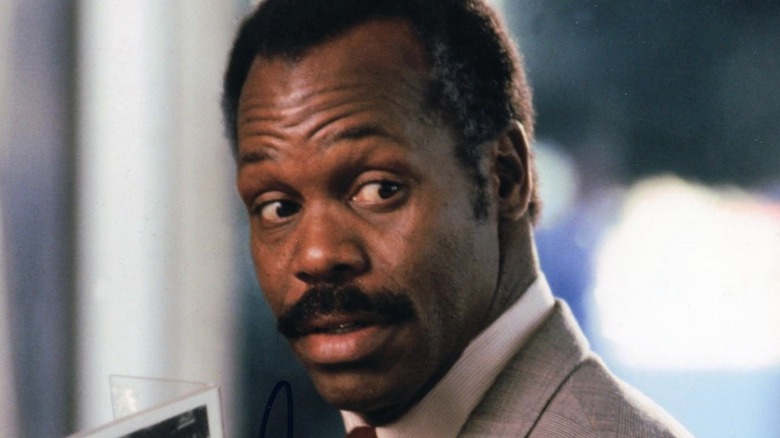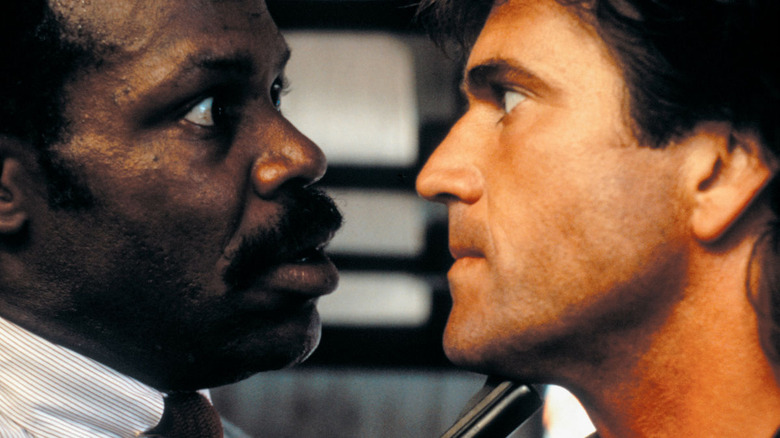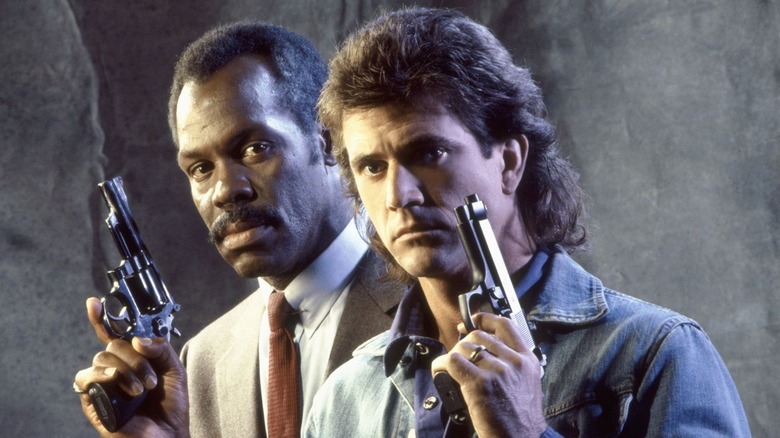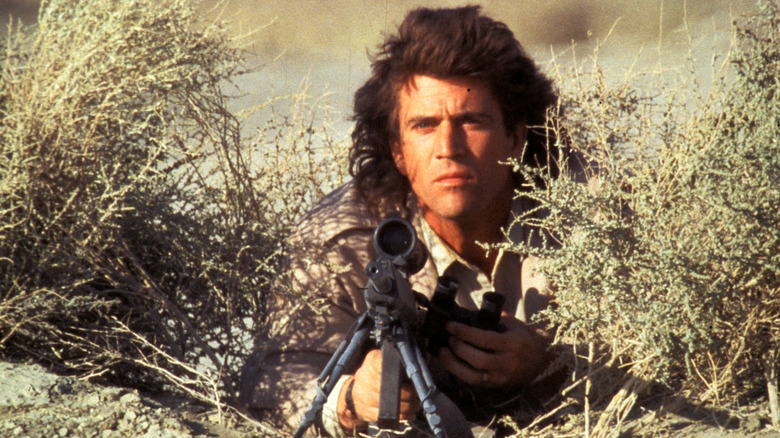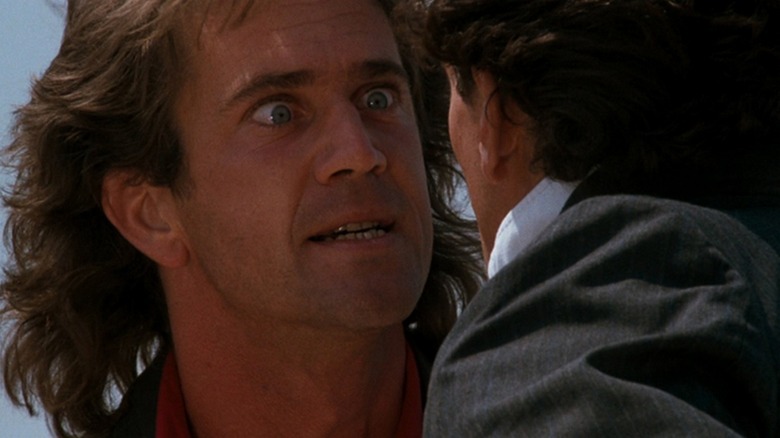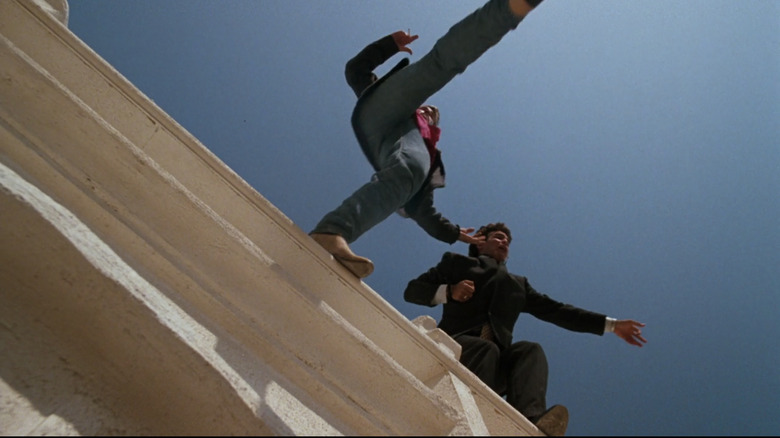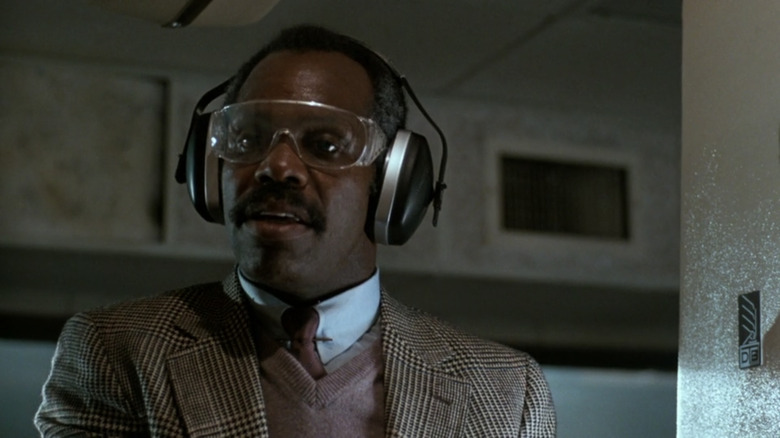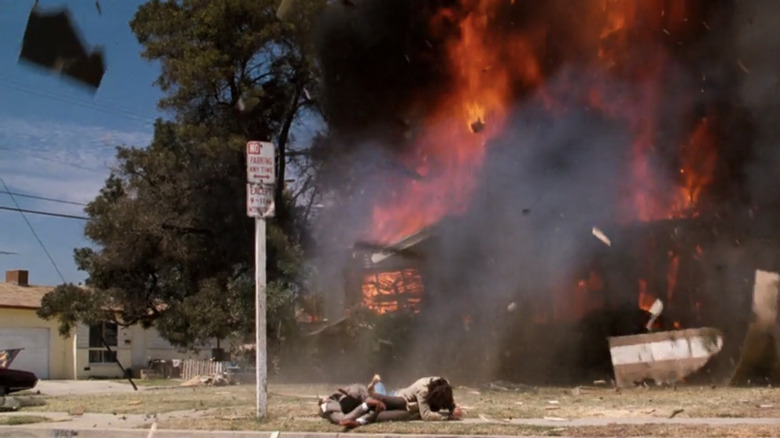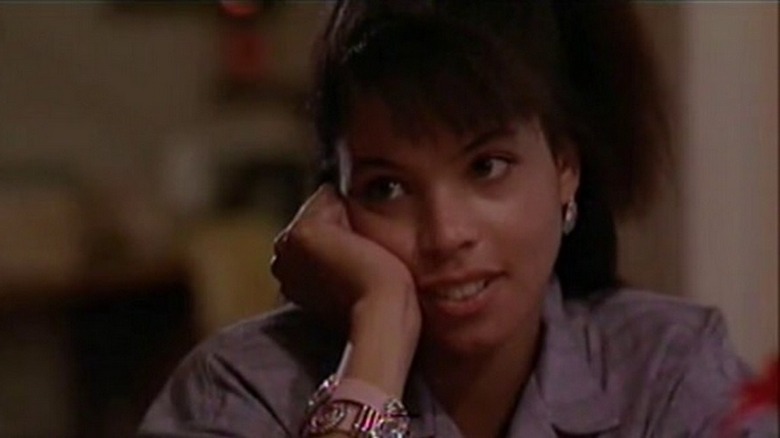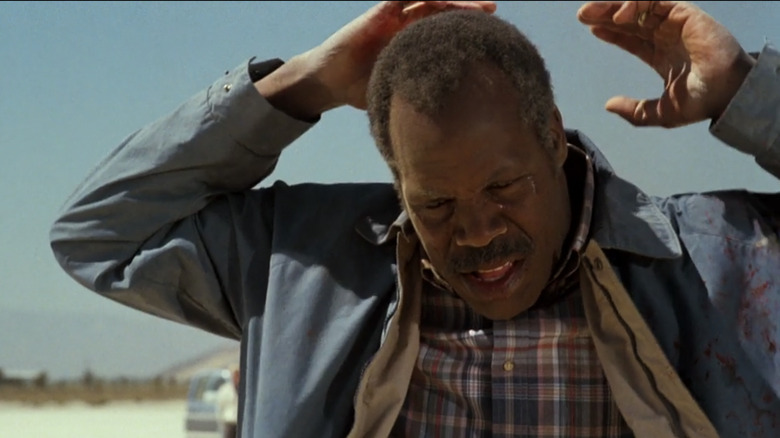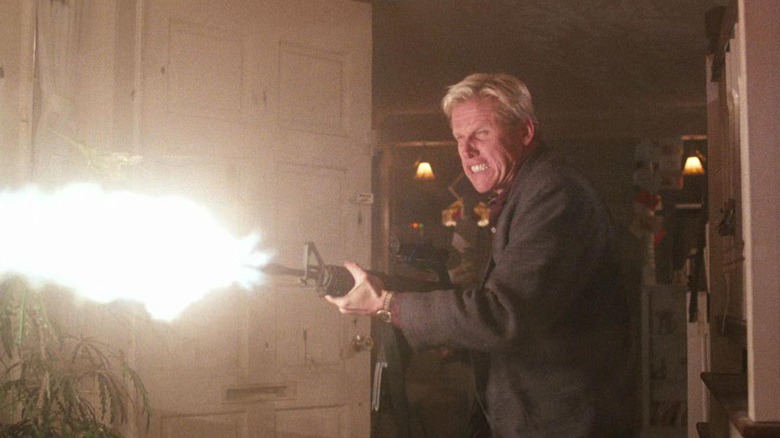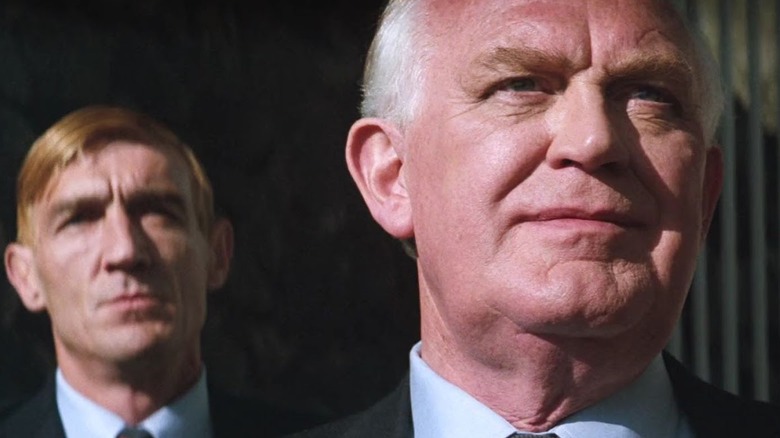Things You Only Notice In Lethal Weapon After Watching It Again
The late director Richard Donner left a lot of classics behind, but few have been as influential as "Lethal Weapon." The pairing of Mel Gibson and Danny Glover as a suicidal loose cannon and level-headed family man all but invented the buddy cop formula that's been copied hundreds of times, and it elevated both actors to the heights of stardom (the jury's still out on whether that was such a good idea). It turned first-time screenwriter Shane Black into one of the most in-demand talents in Hollywood. It inspired three top-grossing sequels, and it returned to the small screen as recently as 2019. Most of all, it engraved Glover's classic line — "I'm too old for this s***" — into all our vocabularies.
For all these reasons, "Lethal Weapon" is a movie '80s action fans return to again and again, and it's been such a staple of cable TV that even skeptics have probably seen it a time or two. That's a good thing because Donner and Black filled the movie with subtle references and subtexts that are easy to miss the first time around — and some embarrassing bloopers they probably hoped we missed. Here are just a few of them.
Riggs and Murtaugh have the same initials
A big secret to the success of "Lethal Weapon" is the mismatched duo at its center. Gibson and Glover's characters, Martin Riggs and Roger Murtaugh, are so opposite they'd never have worked together under ordinary circumstances. Murtaugh is a level-headed old pro. Riggs is the ultimate young hothead, so much so that he may or may not literally be crazy.
You can tell how different they are just looking at them. Murtaugh keeps it neat in his suit and tie, but Riggs looks like he just rolled out of bed with his unbuttoned shirt and unzipped jacket. Donner emphasizes how different they are the moment we first see them. Murtaugh's celebrating his birthday with his large, loving family in his suburban dream home. Riggs is alone in the dark in his unkempt trailer, and we learn he lost the only family he had when his wife died in a car accident. The fun of "Lethal Weapon" has less to do with watching stuff blow up and more with watching these mismatched personalities blow up at each other and eventually learn to work together.
Or are they so different? If you break the team down to their initials, you get R.M. and M.R. Does the reversed order emphasize what perfect opposites they are? Or do the repeated letters suggest that maybe they're not so different after all?
Riggs and Murtaugh would never be on this case in real life
If you watch "Lethal Weapon" again, it becomes obvious that Riggs and Murtaugh aren't just an unlikely team — they're the worst possible people for this job. Amanda, the victim of the murder that sets the story in motion, is the daughter of Murtaugh's old army buddy Michael Hunsaker. That's already a major conflict of interest even before Hunsaker tells him at high volume in a room full of witnesses, "You owe me! I want you to kill them!"
Speaking of extrajudicial killings, it's hard to imagine any real police department would put Riggs back on the street for this case. In our first glimpse of him on the job, Riggs gets into a violent shootout with a hefty body count. The filmmakers can be forgiven for expecting audiences to believe he'd get back to work so soon in 1987. But the number of high-profile police shootings in the past decade means even the average civilian today knows that officers go on paid suspension after shooting just one person, let alone instigating a full-on bloodbath.
But no one could mistake "Lethal Weapon" for a documentary (and that's the least of the reasons why), because he's back to work just hours later. And based on the confirmed kills he racks up over the course of the movie, it's a miracle Riggs didn't get yanked off the case partway through, or at least yelled at by the hardnosed chief every other one of these movies has.
Riggs is a literal cowboy cop
"Lethal Weapon" is a classic example of the "cowboy cop" subgenre — movies whose heroes act more like Wild West lawmen than dutiful police officers and break every rule in the book to get their man. That's certainly the case for trigger-happy Riggs, and some details in "Lethal Weapon" make him a more literal example than most.
His shabby chic ensemble includes a pair of cowboy boots for one thing. For another, Mel Gibson affects the iconic drawl of the ultimate cowboy star, John Wayne. He even calls Murtaugh "Cochise" — possibly a reference to Wayne's friendship with the historical Native American chief in "Fort Apache." And like all cowboy cops, Riggs' approach to his duties is closer to frontier justice than modern law and order. He's more likely to gun down perps than take them downtown in the back of his police cruiser, and he even gets a "High Noon"-style showdown with the bad guys in the middle of the desert.
What would have happened to Riggs if he'd been benched?
On his DVD audio commentary, Richard Donner said he came to "Lethal Weapon" after he'd all but given up on reading action scripts. But Shane Black's screenplay got his attention because it wasn't just one explosion after another (even though it certainly is that). It was grounded in real characters whose personalities drove the story. He may have been thinking of the darkness behind Riggs' zany personality — his suicidal grief over his wife's recent death.
The police department might be willing to overlook Rigg's murderous tactics, but his depression gives the staff psychiatrist pause over putting him back to work. She thinks his death wish is dangerous, and she doesn't trust him on the streets. But Riggs goes to work anyway, and if you're watching closely, you'll be glad he does. When he confesses his suicidal tendencies to Murtaugh, Riggs says, "You know why I don't do it? The job! Doin' the job! Now that's the reason!" Imagine what would have happened to him if the psychiatrist had her way and took away the one thing giving him the will to live.
Riggs and the jumper's handcuffs break when they jump
Watching "Lethal Weapon" in the latest restoration, in the highest possible resolution and with the pause button at the ready, is a great way to catch all the little details you might have missed. But you'll also find some things Donner was counting on you not being able to see.
Take for instance the iconic scene of Riggs trying to talk a man off a ledge. Since he's suicidal himself, he's probably not the best man for the job, and his ... let's say unique style of policing terrifies the poor guy. Finally, Riggs cuffs himself to the jumper and takes a leap off the ledge. Fortunately, while Riggs was distracting him, the other cops had set out a cushion for them to land safely on.
At first glance, you're probably too caught up in the drama of the moment not to take the stunt at face value. But take another look. Those prop cuffs break clean in two when the characters jump. It's not subtle either — they snap like a rubber band. The stuntmen do what they can to cover it up by holding hands, but once you see it, you can't un-see it. But movie magic isn't so different from regular magic. The secret is misdirection, and as long as you're paying attention to the story, you'll never notice the mistake.
If you or anyone you know is having suicidal thoughts, please call the National Suicide Prevention Lifeline at 1-800-273-TALK (8255).
How did Riggs and Murtaugh hear each other on the shooting range?
Early on, the case already seems to be closed. Riggs and Murtaugh investigate Amanda's pimp, and when he opens fire on them, it seems they've found their man. But on the shooting range, Riggs suggests the crime goes deeper than that. That's important, but the scene's less important in developing plot than character, as the two Vietnam veterans engage in some good old-fashioned member-measuring one-upmanship. That leads to the movie's funniest scene when we see just how fancy Riggs' shooting can get.
But anyone who's ever been on a shooting range themselves or even has a good sense of what one's like may be wondering how they're able to talk at all. Gunshots are literally deafening in any environment, let alone an echo-heavy enclosed shooting range. It'd be hard enough to talk over that, but most gun ranges require heavy-duty ear protection to keep all those shots from shattering your eardrums. And instead of leaning on artistic license, Riggs and Murtaugh wear heavy earmuffs all through the sequence. They don't even take them off when they're not shooting, and yet they're able to carry on the whole conversation without even raising their voices. Well, Donner also directed "Superman." Maybe Riggs and Murtaugh share the Man of Steel's super hearing?
Riggs and Murtaugh switch heights when they're stunt doubles
Stunt work may be the most difficult job in Hollywood. In the pre-CGI days, action movies lived or died on these artists' performances, and they still do to some extent. And speaking of living or dying, stunt doubles are literally risking their lives for our entertainment, as the news from Amazon's "Lord of the Rings" series recently reminded us. But they also rarely achieve the fame of the stars they're standing in for. If they do their job right, you'll never know they're there at all.
And when they (or the people casting them) do their job wrong, you get this. Riggs and Murtaugh's shooting-range conversation inspires them to chase another lead from Dixie (Lycia Naff), witness to and possible culprit for Amanda's death. Not only does she know who did it, she knows too much for the bad guys' comfort because her house blows to bits before Riggs and Murtaugh can walk in the door. Watch that scene closely — as the two of them walk side by side across the street, you can see that Mel Gibson is almost a good foot shorter than Danny Glover. But when we cut to another shot of them from the back, they're suddenly the same height — because they're not Gibson and Glover any more. If you spot the stunt doubles on first watch, you've got a pretty good spoiler seconds ahead of time that something action-packed is about to happen. Or, as Riggs puts it, something's about to go "Kerflooey!"
Rianne pushes the corpse out of the way with little touching
When Riggs and Murtaugh finally follow the drug-smuggling conspiracy that led to Amanda's murder all the way to the top, the bad guys are already ahead of them. They gun the duo down in a drive-by shooting, seemingly killing Riggs. Then Murtaugh learns they've kidnapped his oldest daughter Rianne to force him into a showdown. Since the heavily armed bad guys weren't prepared for an ambush by the not-actually-dead Riggs, the showdown quickly descends into a shootout.
Rianne was an early role for Traci Wolfe, who had only acted once before, on an episode of "The Cosby Show." Her inexperience shows in one embarrassing shot of her reacting to the carnage around her by waving her arms like a toddler. But she also conveys Rianne's fear in more effective, subtler ways that are easy to miss on first viewing.
Rianne tries to escape in one of the bad guys' cars, currently occupied by one very dead bad guy. She has to push the corpse out of the driver's seat first, and she handles this situation just the way most teenagers really would. Grossed out and horrified by the dead body, she gingerly pushes it out of the way with just the tips of her fingers.
The desert showdown literally turns Murtaugh gray
As his catchphrase should tell you, Murtaugh's worries about aging are central to his character. We first meet him celebrating his birthday. When one of his kids comments on his beard turning gray, he shaves it off. Donner finds a way to subtly reinforce Murtaugh's arc in the desert shootout, subtle enough that you may have missed it the first time around. All that gunfire kicks up a lot of dust and sand, and if you take a look, some of it ends up in Murtaugh's hair, turning it from black to charcoal gray.
There's a double visual pun going on here too. Gray hair can be a sign of aging, but it can also be a sign of stress whenever someone says something is "turning my hair gray." Well, it's hard to imagine anything more stressful than being shot at by a dozen gangsters with military-grade hardware, and would you look at that — the shootout really does turn Murtaugh gray, at least until he washes his hair out.
Joshua never could have shot at Riggs if the police had done their job
In the climax, Riggs and Murtaugh hunt down the General (Mitchell Ryan) masterminding the drug-smuggling operation who gave the order to kill Amanda. But in the chaos, his right-hand man Mister Joshua (Gary Busey) gets away and holds the Murtaughs hostage. More officers arrive for backup, but they stand by and watch as Joshua and Riggs duke it out barehanded. After he wins, Riggs shows some truly out-of-character restraint and lets the other officers arrest Joshua instead of killing him right then and there because "he's not worth it."
The cops slap two sets of cuffs on Joshua's wrists, each one tethering him to a different officer. No real policeman would ever do this — regulations clearly spell out that perps should always be cuffed with their hands behind their back. And it soon becomes obvious why that is. These restraints don't restrain Joshua much at all, and he's able to pull out his gun and take a shot at Riggs. This means Riggs and Murtaugh end up gunning Joshua down in self-defense. Guess he was worth it after all.
Murtaugh's fridge predicts the plot of the sequel
It's easy to take them for granted, but unless a film shoots on location, every detail on a movie set has to be specifically chosen. If filmmakers have to put that much effort into dressing their sets, there's going to be a reason behind every choice. On the "Lethal Weapon" audio commentary, Donner says he took his movies seriously as a soapbox for political causes, and he decorates the Murtaughs' fridge with magnets for a number of them, including one that says, "Free South Africa: End Apartheid." Later, one of the kids they interrogate about the house bombing wears a shirt with a design in the distinctive style of the great street artist Keith Haring. The slogan isn't visible, but Donner identifies it as another anti-apartheid message.
At the time, apartheid was big news. South Africa's official policy (in English, "apartness") was a policy of radical segregation to ensure the dominance of the European-descended minority over the indigenous majority and other ethnic groups. By the time "Lethal Weapon" premiered, apartheid was the target of widespread international outcry, eventually leading to the election of anti-apartheid activist Nelson Mandela as president. Donner's messages in the movie are almost subliminal, but they're hard to ignore in the sequel, where Riggs and Murtaugh uncover a smuggling ring run by South African diplomats. It's tough to imagine Donner knew that when he was making the first "Lethal Weapon," but in hindsight, Murtaugh's fridge makes a great bit of foreshadowing.
